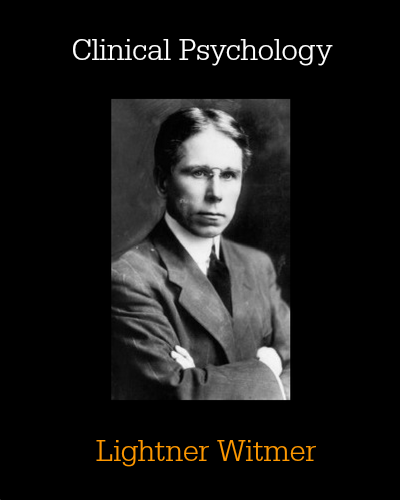Psychology Classics On Amazon

Lightner Witmer: Clinical Psychology
First published in 1907, this landmark paper by Lightner Witmer resulted in the author being widely acknowledged as the founder of clinical psychology. Within this classic text, Witmer defines the phraseology and scope of clinical psychology and discusses the circumstances by which he came to open his psychological clinic at the University of Pennsylvania in March 1896.
The Article in Full
During the last ten years the laboratory of psychology at the University of Pennsylvania has conducted, under my direction, what I have called "a psychological clinic". Children from the public schools of Philadelphia and adjacent cities have been brought to the laboratory by parents or teachers; these children had made themselves conspicuous because of an inability to progress in school work as rapidly as other children, or because of moral defects which rendered them difficult to manage under ordinary discipline.
When brought to the psychological clinic, such children are given a physical and mental examination; if the result of this examination shows it to be desirable, they are then sent to specialists for the eye or ear, for the nose and throat, and for nervous diseases, one or all, as each case may require. The result of this conjoint medical and psychological examination is a diagnosis of the child's mental and physical condition and the recommendation of appropriate medical and pedagogical treatment. The progress of some of these children has been followed for a term of years.
To illustrate the operation of the psychological clinic, take a recent case sent to the laboratory from a city of Pennsylvania, not far from Philadelphia. The child was brought by his parents, on the recommendation of the Superintendent of Schools. Examination revealed a boy ten years of age, without apparent physical defect, who had spent four years at school, but had made so little progress that his ignorance of the printed symbols of the alphabet made it necessary to use the illiterate card to test his vision. Nothing in the child's heredity or early history revealed any ground for the suspicion of degeneracy, nor did the child's physical appearance warrant this diagnosis. The boy appeared to be of normal intelligence, except for the retardation in school work. The examination of the neurologist to whom he was sent, Dr. William G. Spiller, confirmed the absence of conspicuous mental degeneracy and of physical defect. The oculist, Dr. William C. Posey, found nothing more serious than a slight far-sighted astigmatism, and the examination of Dr. George C. Stout for adenoids, gave the child a clean bill of health, so far as the nose and pharynx were concerned. On the conclusion of this examination he was, necessarily, returned to the school from which he came, with the recommendation to the teacher of a course of treatment to develop the child's intelligence. It will require at least three months' observation to determine whether his present pedagogical retardation is based upon an arrest of cerebral development or is merely the result of inadequate methods of education. This case is unequivocally one for the psychologist.
My attention was first drawn to the phenomena of retardation in the year 1889. At that time, while a student of psychology at the University of Pennsylvania, I had charge of the English branches in a college preparatory school of Philadelphia. In my classes at this academy I was called upon to give instruction in English to a boy preparing for entrance to college, who showed a remarkable deficiency in the English language. His compositions seldom contained a single sentence that had been correctly formed. For example, there was little or no distinction between the present and the past tenses of verbs; the endings of many words were clipped off, and this was especially noticeable in those words in which a final ending distinguished the plural from the singular, or an adverb from an adjective. As it seemed doubtful whether he would ever be able to enter college without special instruction in English, I was engaged to tutor him in the English branches.
I had no sooner undertaken this work than I saw the necessity of beginning with the elements of language and teaching him as one would teach a boy, say, in the third grade. Before long I discovered that I must start still further back. I had found it impossible, through oral and written exercises, to fix in his mind the elementary forms of words as parts of speech in a sentence. This seemed to be owing to the fact that he had verbal deafness. He was quite able to hear even a faint sound, like the ticking of a watch, but he could not hear the difference in the sound of such words as grasp and grasped . This verbal deafness was associated with, and I now believe was probably caused by, a defect of articulation. Thus the boy's written language was a fairly exact replica of his spoken language; and he probably heard the words that others spoke as he himself spoke them. I therefore undertook to give him an elementary training in articulation to remedy the defects which are ordinarily corrected, through imitation, by the time a child is three or four years old. I gave practically no attention to the subjects required in English for college entrance, spending all my time on the drill in articulation and in perfecting his verbal audition and teaching him the simplest elements of written language. The result was a great improvement in all his written work, and he succeeded in entering the college department of the University of Pennsylvania in the following year.
In 1894-95, I found him as a college student in my classes at the University of Pennsylvania. His articulation, his written discourse and his verbal audition were very deficient for a boy of his years. In consequence he was unable to acquire the technical terminology of my branch, and I have no doubt that he passed very few examinations excepting through the sympathy of his instructors who overlooked the serious imperfections of his written work, owing to the fact that he was in other respects a fair student.
When it came to the final examinations for the bachelor's degree, however, he failed and was compelled to repeat much of the work of his senior year. He subsequently entered and graduated from one of the professional departments of the University. His deficiencies in language, I believe, have never been entirely overcome.
I felt very keenly how much this boy was losing through his speech defect. His school work, his college course, and doubtless his professional career were all seriously hampered. I was confident at the time, and this confidence has been justified by subsequent experience with similar cases, that if he had been given adequate instruction in articulation in the early years of childhood, he could have overcome his defect. With the improvement in articulation there would have come an improved power of apprehending spoken and written language. That nothing was done for him in the early years, nor indeed at any time, excepting for the brief period of private instruction in English and some lessons in elocution, is remarkable, for the speech defect was primarily owing to an injury to the head in the second year of life, and his father was a physician who might have been expected to appreciate the necessity of special training in a case of retardation caused by a brain injury.
The second case to attract my interest was a boy fourteen years of age, who was brought to the laboratory of psychology by his grade teacher. He was one of those children of great interest to the teacher, known to the profession as a chronic bad speller. His teacher, Miss Margaret T. Maguire, now the supervising principal of a grammar school of Philadelphia, was at that time a student of psychology at the University of Pennsylvania; she was imbued with the idea that a psychologist should be able, through examination, to ascertain the causes of a deficiency in spelling and to recommend the appropriate pedagogical treatment for its amelioration or cure.
With this case, in March, 1896, the work of the psychological clinic was begun. At that time I could not find that the science of psychology had ever addressed itself to the ascertainment of the causes and treatment of a deficiency in spelling. Yet here was a simple developmental defect of memory; and memory is a mental process of which the science of psychology is supposed to furnish the only authoritative knowledge. It appeared to me that if psychology was worth anything to me or to others it should be able to assist the efforts of a teacher in a retarded case of this kind.
"The final test of the value of what is called science is its applicability" are words quoted from the recent address of the President of the American Association for the Advancement of Science. With Huxley and President Woodward, I believe that there is no valid distinction between a pure science and an applied science. The practical needs of the astronomer to eliminate the personal equation from his observations led to the invention of the chronograph and the chronoscope. Without these two instruments, modern psychology and physiology could not possibly have achieved the results of the last fifty years. If Helmholtz had not made the chronograph an instrument of precision in physiology and psychology; if Fechner had not lifted a weight to determine the threshold of sensory discrimination, the field of scientific work represented to-day by clinical psychology could never have been developed. The pure and the applied sciences advance in a single front. What retards the progress of one, retards the progress of the other; what fosters one, fosters the other. But in the final analysis the progress of psychology, as of every other science, will be determined by the value and amount of its contributions to the advancement of the human race.
The absence of any principles to guide me made it necessary to apply myself directly to the study of these children, working out my methods as I went along. In the spring of 1896 I saw several other cases of children suffering from the retardation of some special function, like that of spelling, or from general retardation, and I undertook the training of these children for a certain number of hours each week. Since that time the psychological clinic has been regularly conducted in connection with the laboratory of psychology at the University of Pennsylvania. The study of these cases has also formed a regular part of the instruction offered to students in child psychology.
In December, 1896, I outlined in an address delivered before the American Psychological Association a scheme of practical work in psychology. The proposed plan of organization comprised:
- The investigation of the phenomena of mental development in school children, as manifested more particularly in mental and moral retardation, by means of the statistical and clinical methods.
- A psychological clinic, supplemented by a training school in the nature of a hospital school, for the treatment of all classes of children suffering from retardation or physical defects interfering with school progress.
- The offering of practical work to those engaged in the professions of teaching and medicine, and to those interested in social work, in the observation and training of normal and retarded children.
- The training of students for a new profession-that of the psychological expert, who should find his career in connection with the school system, through the examination and treatment of mentally and morally retarded children, or in connection with the practice of medicine.
In the summer of 1897 the department of psychology in the University of Pennsylvania was able to put the larger part of this plan into operation. A four weeks' course was given under the auspices of the American Society for the Extension of University Teaching. In addition to lecture and laboratory courses in experimental and physiological psychology, a course in child psychology was given to demonstrate the various methods of child psychology, but especially the clinical method. The psychological clinic was conducted daily, and a training school was in operation in which a number of children were under the daily instruction of Miss Mary E. Marvin. At the clinic, cases were presented of children suffering from defects of the eye, the ear, deficiency in motor ability, or in memory and attention; and in the training school, children were taught throughout the session of the Summer School, receiving pedagogical treatment for the cure of stammering and other speech defects, for defects of written language (such as bad spelling), and for motor defects.
From that time until the present I have continued the examination and treatment of children in the psychological clinic. The number of cases seen each week has been limited, because the means were not at hand for satisfactorily treating a large number of cases. I felt, also, that before offering to treat these children on a large scale I needed some years of experience and extensive study, which could only be obtained through the prolonged observation of a few cases. Above all, I appreciated the great necessity of training a group of students upon whose assistance I could rely. The time has now come for a wider development of this work. To further this object and to provide for the adequate publication of the results that are being obtained in this new field of psychological investigation, it was determined to found this journal, The Psychological Clinic.
My own preparation for the work has been facilitated through my connection as consulting psychologist with the Pennsylvania Training School for Feeble-Minded Children at Elwyn, and a similar connection with the Haddonfield Training School and Miss Marvin's Home School in West Philadelphia.
Clinical psychology is naturally very closely related to medicine. At the very beginning of my work I was much encouraged by the appreciation of the late Provost of the University of Pennsylvania, Dr. William Pepper, who at one time proposed to establish a psychological laboratory in connection with the William Pepper Clinical Laboratory of Medicine. At his suggestion, psychology was made an elective branch in what was then the newly organized fourth year of the course in medicine. At a subsequent reorganization of the medical course, however, it was found necessary to drop the subject from the curriculum.
I also desire to acknowledge my obligation to Dr. S. Weir Mitchell for co-operation in the examination of a number of cases and for his constant interest in this line of investigation. I have also enjoyed the similar co-operation of Dr. Charles K. Mills, Dr. William G. Spiller, the late Dr. Harrison Allen, Dr. Alfred Stengel, Dr. William Campbell Posey, Dr. George C. Stout, and Dr. Joseph Collins, of New York. Dr. Collins will continue this co-operation as an associate editor of The Psychological Clinic.
The appreciation of the relation of psychology to the practice of medicine in general, and to psychiatry in particular, has been of slow growth. The first intelligent treatment of the insane was accorded by Pinel in the latter part of the eighteenth century, a century that was marked by the rapid development of the science of psychology, and which brought forth the work of Pereire in teaching oral speech to the deaf, and the "Emile" of Rousseau. A few medical men have had a natural aptitude for psychological analysis. From them has come the chief development of the medical aspects of psychology,-from Seguin and Charcot in France, Carpenter and Maudsley in England, and Weir Mitchell in this country. Psychological insight will carry the physician or teacher far on the road to professional achievement, but at the present day the necessity for a more definite acquaintance with psychological method and facts is strongly felt. It is noteworthy that perhaps the most prominent name connected with psychiatry to-day is that of Kraepelin, who was among the first to seek the training in experimental psychology afforded by the newly established laboratory at Leipzig.
Although clinical psychology is closely related to medicine, it is quite as closely related to sociology and to pedagogy. The school room, the juvenile court, and the streets are a larger laboratory of psychology. An abundance of material for scientific study fails to be utilized, because the interest of psychologists is elsewhere engaged, and those in constant touch with the actual phenomena do not possess the training necessary to make their experience and observation of scientific value.
While the field of clinical psychology is to some extent occupied by the physician, especially by the psychiatrist, and while I expect to rely in a great measure upon the educator and social worker for the more important contributions to this branch of psychology, it is nevertheless true that none of these has quite the training necessary for this kind of work. For that matter, neither has the psychologist, unless he has acquired this training from other sources than the usual course of instruction in psychology. In fact, we must look forward to the training of men to a new profession which will be exercised more particularly in connection with educational problems, but for which the training of the psychologist will be a prerequisite.
For this reason not a small part of the work of the laboratory of psychology in the University of Pennsylvania for the past ten years has been devoted to the training of students in child psychology, and especially in the clinical method. The greater number of these students have been actively engaged in the profession of teaching. Important contributions to psychology and pedagogy, the publication of which in the form of monographs has already been begun, will serve to demonstrate that original research of value can be carried on by those who are actively engaged in educational or other professional work. There have been associated in this work of the laboratory of psychology, Superintendent Twitmyer, of Wilmington; Superintendent Bryan, of Camden; District Superintendent Cornman, of Philadelphia; Mr. J. M. McCallie, Supervising Principal of the Trenton Schools; Mr. Edward A. Huntington, Principal of a Special School in Philadelphia; Miss Clara H. Town, Resident Psychologist at the Friends' Asylum for the Insane, and a number of special teachers for the blind, the deaf, and mentally deficient children. I did not venture to begin the publication of this journal until I felt assured of the assistance of a number of fellow-workers in clinical psychology as contributors to the journal. As this work has grown up in the neighborhood of Philadelphia, it is probable that a greater number of students, equipped to carry on the work of clinical psychology, may be found in this neighborhood than elsewhere, but it is hoped that this journal will have a wider influence, and that the co-operation of those who are developing clinical psychology throughout the country will be extended the journal.
The phraseology of "clinical psychology" and "psychological clinic" will doubtless strike many as an odd juxtaposition of terms relating to quite disparate subjects. While the term "clinical" has been borrowed from medicine, clinical psychology is not a medical psychology. I have borrowed the word "clinical" from medicine, because it is the best term I can find to indicate the character of the method which I deem necessary for this work. Words seldom retain their original significance, and clinical medicine, is not what the word implies,-the work of a practicing physician at the bedside of a patient. The term "clinical" implies a method, and not a locality. When the clinical method in medicine was established on a scientific basis, mainly through the efforts of Boerhaave at the University of Leiden, its development came in response to a revolt against the philosophical and didactic methods that more or less dominated medicine up to that time. Clinical psychology likewise is a protestant against a psychology that derives psychological and pedagogical principles from philosophical speculations and against a psychology that applies the results of laboratory experimentation directly to children in the school room.
The teacher's interest is and should be directed to the subjects which comprise the curriculum, and which he wishes to impress upon the minds of the children assigned to his care. It is not what the child is, but what he should be taught that occupies the center of his attention. Pedagogy is primarily devoted to mass instruction, that is, teaching the subjects of the curriculum to classes of children without reference to the individual differences presented by the members of a class. The clinical psychologist is interested primarily in the individual child. As the physician examines his patient and proposes treatment with a definite purpose in view, namely the patient's cure, so the clinical psychologist examines a child with a single definite object in view,-the next step in the child's mental and physical development. It is here that the relation between science and practice becomes worthy of discrimination. The physician may have solely in mind the cure of his patient, but if he is to be more than a mere practitioner and to contribute to the advance of medicine, he will look upon his efforts as an experiment, every feature of which must indeed have a definite purpose,-the cure of the patient,-but he will study every favorable or unfavorable reaction of the patient with reference to the patient's previous condition and the remedial agents he has employed. In the same way the purpose of the clinical psychologist, as a contributor to science, is to discover the relation between cause and effect in applying the various pedagogical remedies to a child who is suffering from general or special retardation.
I would not have it thought that the method of clinical psychology is limited necessarily to mentally and morally retarded children. These children are not, properly speaking, abnormal, nor is the condition of many of them to be designated as in any way pathological. They deviate from the average of children only in being at a lower stage of individual development. Clinical psychology, therefore, does not exclude from consideration other types of children that deviate from the average-for example, the precocious child and the genius. Indeed, the clinical method is applicable even to the so-called normal child. For the methods of clinical psychology are necessarily invoked wherever the status of an individual mind is determined by observation and experiment, and pedagogical treatment applied to effect a change, i.e., the development of such individual mind. Whether the subject be a child or an adult, the examination and treatment may be conducted and their results expressed in the terms of the clinical method.
This stylish Clinical Psychology T-Shirt is perfect for anybody with an interest in the fascinating branch of applied psychology concerned with understanding, preventing, and relieving psychologically-based distress or dysfunction. Also ideal for clinical psychologists and psych majors considering a career in the field. Sales help support All-About-Psychology.Com which has been providing free and comprehensive information and resources for psychology students and educators since 2008.
Recent Articles
-
Billy Milligan Case Study: Psychology, Crime, and the Split Mind
Apr 18, 25 09:10 AM
Was Billy Milligan a fractured victim—or a manipulative genius? This Billy Milligan case study explores the psychology behind one of history’s most controversial trials. -
Borderline Personality Disorder: More Than Mood Swings
Apr 18, 25 07:11 AM
Discover key facts about Borderline Personality Disorder, its symptoms, causes, treatment options, and why raising awareness is vital. -
Psychology Book Marketing
Apr 17, 25 04:56 AM
Psychology book marketing. Ignite your book's visibility by leveraging the massive reach of the All About Psychology website and social media channels.
Please help support this website by visiting the All About Psychology Amazon Store to check out an awesome collection of psychology books, gifts and T-shirts.
Go To The Classic Psychology Journal Articles Page






